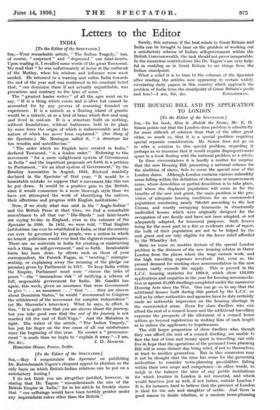Letters to the Editor
INDIA
[To the Editor of the SPECTATOR.]
Sin,—Your remarkable article, " The Indian Tragedy," has, of course, " surprised " and " depressed " our faint-hearts. Upon reading it, I recalled some words of the great Townsend. We read that "'he was unfortunately at home at the outbreak of the Mutiny, when his wisdom and influence were most needed. He returned to a warring and sullen India towards the end of the year and was confirmed in his constant belief that, " our dominion there if not actually unjustifiable, was precarious and contrary to the laws of sense."
The " greatest leader writer " of all the ages went on to say, " It is a thing which exists and is alive but cannot be accounted for by any process of reasoning founded on experience. It is a miracle as a floating island of granite would be a miracle, or as a bird of brass which flew and sang and lived in mid-air. It is a structure built on nothing, without foundations, without buttresses, held in its place by some force the origin of which is indiscoverable and the nature of which has never been explained." (See Story of the Spectator.) Mr. Montague called it, " A structure far too wooden and antediluvian."
" The order which we English have created in India," declared Townsend, " is a leaden order." Referring to the movement " for a more enlightened system of Government in India " and the important proposals set forth hi a petition
to Parliament, " for an ideal system of Government," by the Bombay Association in August, 1852, Rio toul manfully declared in the Spectator of that year, " It would be a lamentable mistake to suppose that a movement like this can be put down. It would be a positive gain to the British, since it would commence in a more thorough style than we have yet attempted the work of identifying the natives, their affections and progress with. English institutions."
Now, if we study what was said in the " Anglo-Indian"
and the British Press at that time, we End a remarkable resemblance to all that our " Die-Harris " and faint-hearts are saying to-day in England, even in the columns of the Spectator in 1930. In 1852, we were told, " That English institutions can ever be established in India, or that the country can ever be governed by the people, was a notion to which no honest politician would ever lend the slightest countenance. There are no materials in India for creating or maintaining such a thing as self-government," and so forth. Incalculable harm has been done, by efforts such as those of your correspondent, Sir Patrick Fagan, in " twisting," misrepre- senting,_ or explaining away the meaning of the pledge (or promise) given by Parliament in 1917. To keep India within the Empire, Parliament must soon " choose the risks. of peace "—the " tremendous risk " of ratifying a scheme of full, responsible government for India. Mr. Gandhi has again, this week, given an assurance that were Government to give .". . . an assurance . . ." that ". . . they are sincere about Dominion Status," he would " recommend to Congress the withdrawal of the movement for complete independence" (at Mr. Slocombe's interview). What he says, in effect, is this, " It is quite true that you are sincere about the journey, but you take good care that the end of the journey is not reached till the end of Kali-Yuga." And the Mahatma is right. The writer of the article, " The Indian Tragedy," has put his finger on the true cause of all our misfortunes since the beginning of this year. No sooner a " pronounce- ment " is made than we begin to "explain it away."—I am,


































 Previous page
Previous page